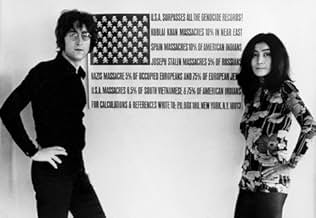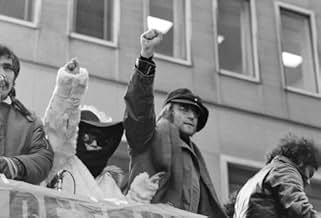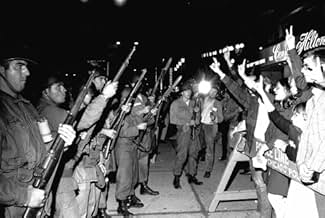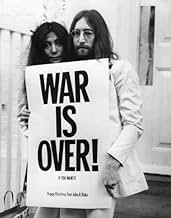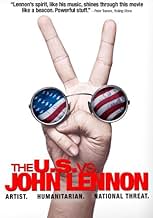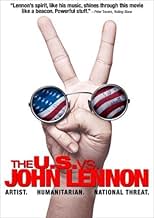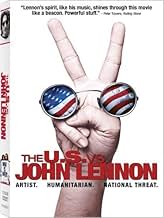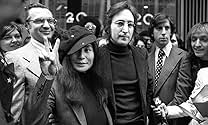CALIFICACIÓN DE IMDb
7.3/10
5.7 k
TU CALIFICACIÓN
Agrega una trama en tu idiomaA documentary on the life of John Lennon, with a focus on the time in his life when he transformed from a musician into an antiwar activist.A documentary on the life of John Lennon, with a focus on the time in his life when he transformed from a musician into an antiwar activist.A documentary on the life of John Lennon, with a focus on the time in his life when he transformed from a musician into an antiwar activist.
- Dirección
- Guionistas
- Elenco
- Premios
- 2 nominaciones en total
John Lennon
- Self
- (material de archivo)
- Dirección
- Guionistas
- Todo el elenco y el equipo
- Producción, taquilla y más en IMDbPro
Opiniones destacadas
STAR RATING: ***** Saturday Night **** Friday Night *** Friday Morning ** Sunday Night * Monday Morning
During the 1960s, John Lennon was one part of The Beatles, still almost certainly the most successful British band today. But it was also the time of the Vietnam war and of the 'flower power' generation, which he got very much caught up in, much to the furore of the Nixon administration. This film follows John's escapades during this time, from his peace activist activities, his romance with conceptual artist Yoko Ono who showed him some far-out methods of drawing attention to his cause, his 'stay in bed' crusade after the failure of flower power, his support of the Black Panthers, his far out views on materialism and spirituality and, of course, the Nixon administration's paranoia about his influence on the youth of America at the time, which lead to them tapping his phone and having him followed and, eventually, attempting to get him deported on a bullsh!t possession of marijuanna charge.
Although many of Nixon's worries concerning Lennon were probably a load of hot air, it's doubtless the huge role the man played in inspiring a generation of young people to adopt the ideals of peace and love for your fellow man, which the Nixon administration, hell-bent on sending many young men off to die for a cause they didn't understand let alone believe in, was understandably rattled about. And so it's an interesting idea to make a documentary like this, highlighting the huge influence the man had and the increasingly drastic steps that were taken to try and put a dent in it. Talking heads include figures from the FBI, those caught up in the peace demonstrations, a platoon leader in Vietnam as well as Yoko Ono herself and the then leader of the Black Panthers. It all makes for a very interesting and revealing expose of events involving Lennon at the time, and it all plays out in much this way too. The one problem is that it veers off course from the source material at the time in some parts, leaving the theme of Nixon's harassment of Lennon and playing more like your typical biography of Lennon's life and, in turn, becomes a little meandering and boring, especially towards the end.
Nonetheless, it certainly doesn't fail as a documentary and still maintains an interesting and relevant theme through-out that Lennon enthusiasts and others as well will be very interested in seeing. ***
During the 1960s, John Lennon was one part of The Beatles, still almost certainly the most successful British band today. But it was also the time of the Vietnam war and of the 'flower power' generation, which he got very much caught up in, much to the furore of the Nixon administration. This film follows John's escapades during this time, from his peace activist activities, his romance with conceptual artist Yoko Ono who showed him some far-out methods of drawing attention to his cause, his 'stay in bed' crusade after the failure of flower power, his support of the Black Panthers, his far out views on materialism and spirituality and, of course, the Nixon administration's paranoia about his influence on the youth of America at the time, which lead to them tapping his phone and having him followed and, eventually, attempting to get him deported on a bullsh!t possession of marijuanna charge.
Although many of Nixon's worries concerning Lennon were probably a load of hot air, it's doubtless the huge role the man played in inspiring a generation of young people to adopt the ideals of peace and love for your fellow man, which the Nixon administration, hell-bent on sending many young men off to die for a cause they didn't understand let alone believe in, was understandably rattled about. And so it's an interesting idea to make a documentary like this, highlighting the huge influence the man had and the increasingly drastic steps that were taken to try and put a dent in it. Talking heads include figures from the FBI, those caught up in the peace demonstrations, a platoon leader in Vietnam as well as Yoko Ono herself and the then leader of the Black Panthers. It all makes for a very interesting and revealing expose of events involving Lennon at the time, and it all plays out in much this way too. The one problem is that it veers off course from the source material at the time in some parts, leaving the theme of Nixon's harassment of Lennon and playing more like your typical biography of Lennon's life and, in turn, becomes a little meandering and boring, especially towards the end.
Nonetheless, it certainly doesn't fail as a documentary and still maintains an interesting and relevant theme through-out that Lennon enthusiasts and others as well will be very interested in seeing. ***
I hope everyone sees this film, as it is a window into the life of an extraordinary person, who really did influence a generation with his music and his courage. But, I especially hope that the generations that came after John Lennon left us, so unexpectedly, have a chance to see this thoughtful and fitting tribute to the gentle artist who turned the hurt he experienced as a child into an international revolution with a spirit so open and willing to risk everything he had to teach the world that all we really need is love. This film explains to all of us, who were too young to understand what was going on, at the time, how John Lennon was persecuted by the U.S. government for simply expressing his opinion about the war in Viet Nam. How he was investigated, tapped, and followed, then threatened with deportation, in an effort to derail a tour that might have had a significant influence on the outcome of the 1972 presidential election, in which Richard Nixon was re-elected. The scenes of teenagers burning their Beatles records in protest of his quip that the Beatles had become more popular than Jesus, are eerily parallel with the Dixie Chicks fans who did the same thing. Excerpts from Nixon's speeches about the war are almost word-for-word the same rhetoric we get from Bush. This film is important, and moving, and includes some of the best music I know I'll ever hear in this lifetime. Go see it and get inspired.
Those who do not learn from history are doomed to repeat it. If "The U.S. vs. John Lennon" is anything, it's an examination of the similarities between the Nixon Administration and the national debacle that was the Vietnam War, compared to the current Bush Administration and the national debacle that is the Iraq War. The difference, of course, is that Nixon had John and Yoko Lennon to contend with. Who do we have to lead our protests and write our anthems? Michael Moore? Not good enough.
When Lennon moved to New York City in 1970, the Nixon Administration was terrified that he had the power to organize the anti-war protesters and affect the outcome of elections (particularly Nixon's 1972 run for re-election). Lennon was wiretapped and followed by the FBI (which was being used at that time to "quell decent"). The Immigration and Naturalization Service tried for five years to deport him, but he got a lawyer and fought back, and in 1976, on his birthday, on his son Sean's birthday, he learned that he and Yoko had won their case, and they could stay.
"The U.S. vs. John Lennon" makes you want to take a stand, organize a protest, demand peace, and stick it to the man!
When Lennon moved to New York City in 1970, the Nixon Administration was terrified that he had the power to organize the anti-war protesters and affect the outcome of elections (particularly Nixon's 1972 run for re-election). Lennon was wiretapped and followed by the FBI (which was being used at that time to "quell decent"). The Immigration and Naturalization Service tried for five years to deport him, but he got a lawyer and fought back, and in 1976, on his birthday, on his son Sean's birthday, he learned that he and Yoko had won their case, and they could stay.
"The U.S. vs. John Lennon" makes you want to take a stand, organize a protest, demand peace, and stick it to the man!
For those of us who followed Lennon and the Beatles through those tumultuous years, this was a simple summary that really didn't break any ground or uncover any new information. The filmmakers were more excited to find a few pieces of lost or mislabeled footage, such as Lennon being given his green card, than to enlighten those of us who were along for the ride all along. But it was good to hear from John again, even to say "flower power didn't work, so what? You do something else." No coverage was given John's activism or lack thereof during his infamous "lost weekend." Yoko's constant presence saw to that.
But I would love for my son and his generation to see it. Much of what is going on today has gone unchallenged, and the return of the J. Edgar Hooverization of America has been obvious to those of us who were awake back then.
But I would love for my son and his generation to see it. Much of what is going on today has gone unchallenged, and the return of the J. Edgar Hooverization of America has been obvious to those of us who were awake back then.
"Imagine no possessions, I wonder if you can. No need for greed or hunger. A brotherhood of man. Imagine all the people, Sharing all the world. You may say I'm a dreamer. But I'm not the only one. I hope someday you'll join us. And the world will live as one." John Lennon, "Imagine" "All we are saying, Is give peace a chance." John Lennon, Give Peace a Chance I can't help hearing the song "Imagine" and feeling a little teary-eyed. I still remember being part of the worldwide vigil after John Lennon's murder and hearing the idealistic song, depicting a vision at that time suddenly sounding cruelly out-of-reach. The Beatles is one of those very few groups that seems to enjoy near-universal appreciation, from folks in their teens through those in retirement, including classical music aficionados as well as heavy metal enthusiasts. The songwriting power behind the group was primarily the genius of John Lennon and Paul McCartney, both of whom continued on to successful, creative solo careers.
With that background, how could I not jump at the opportunity to see a film about John Lennon? "The U.S. vs. John Lennon" is a documentary about the life of Lennon, specifically focusing on his peace activism during the Vietnam War era. I was certainly aware of his political engagement and songs such as "Give Peace a Chance", "Power to the People", and "Happy Christmas (War Is Over)". And I vaguely recall that there were some immigration issues that this English man faced in America. But I was not fully aware of, or perhaps forgot, how strongly the Nixon administration sought to deport John Lennon simply based on his views and activism.
The film moved at a very appropriate pace, introducing enough biography to help better understand the germane issues, quickly going through John's childhood, involvement with the Beatles, and marriage to his wife Yoko Ono. Consummate musician, John is quoted as saying that all that he really wanted to do was to make music. But the escalating violence in Vietnam made him an outspoken critic of the war. A master of publicity, he even turned what he knew would be dogged press during his honeymoon to his advantage by staging a well covered love-in for peace urging love and not war.
Richard Nixon held the office of President of the United States from 1969-1974 and is the only President to have resigned, facing impeachment for the "Watergate" scandal and clear abuse of power. In spite of election promises, Nixon plunged the country into deeper war with Vietnam amidst growing public outcry.
With the help of the heavy-handed J. Edgar Hoover, Director of the Federal Bureau of Investigation for almost fifty years (from 1924 until his death in 1972), the Nixon administration sought to silence some in the anti-war movement. It tried to deport John Lennon and, finding that he had a small charge of marijuana possession filed back in England earlier, used that as a pretext to demand his departure.
Eventually, Lennon's lawyer countersued and proved that the Nixon administration has conspired against him, with people from the very top of the government involved. Lennon won and was granted permanent immigration status to allow him to stay in New York, the city he loved. Unfortunately, in 1980, John Lennon was gunned down outside of his New York apartment by a deluded fan.
"The U.S. vs. John Lennon" is a moving film about a person larger than reality as if being a prolific and well-recognized songwriter weren't enough, he was a singer, guitarist, author, and political leader who embodied nonviolence and peace, influenced by Gandhi and he was very influential in each of these areas. Many would say that Lennon was one of the key spokespersons of the generation that came of age in the 1960s, and offered a vision of a world united by zest for living together and not divided by petty differences. It is also a film about how unchecked power can try to wield unfair influence in attacking its perceived enemies.
A vivid history lesson accompanied by many brilliant songs of John Lennon's, I highly recommend "The U.S. vs. John Lennon" to all (note that it is rated PG-13 for some "strong language, violent images and drug references" but I wonder if that is a little overstated). Viewers will (re)learn important biographical and historical aspects of the man and times, and, more importantly, see John Lennon's message for its universality and timelessness. The music alone will likely rekindle or begin new memories, and the documentary is a fascinating review of an important era in recent history.
8 stars out of 10
--Dilip Barman, Durham, NC
With that background, how could I not jump at the opportunity to see a film about John Lennon? "The U.S. vs. John Lennon" is a documentary about the life of Lennon, specifically focusing on his peace activism during the Vietnam War era. I was certainly aware of his political engagement and songs such as "Give Peace a Chance", "Power to the People", and "Happy Christmas (War Is Over)". And I vaguely recall that there were some immigration issues that this English man faced in America. But I was not fully aware of, or perhaps forgot, how strongly the Nixon administration sought to deport John Lennon simply based on his views and activism.
The film moved at a very appropriate pace, introducing enough biography to help better understand the germane issues, quickly going through John's childhood, involvement with the Beatles, and marriage to his wife Yoko Ono. Consummate musician, John is quoted as saying that all that he really wanted to do was to make music. But the escalating violence in Vietnam made him an outspoken critic of the war. A master of publicity, he even turned what he knew would be dogged press during his honeymoon to his advantage by staging a well covered love-in for peace urging love and not war.
Richard Nixon held the office of President of the United States from 1969-1974 and is the only President to have resigned, facing impeachment for the "Watergate" scandal and clear abuse of power. In spite of election promises, Nixon plunged the country into deeper war with Vietnam amidst growing public outcry.
With the help of the heavy-handed J. Edgar Hoover, Director of the Federal Bureau of Investigation for almost fifty years (from 1924 until his death in 1972), the Nixon administration sought to silence some in the anti-war movement. It tried to deport John Lennon and, finding that he had a small charge of marijuana possession filed back in England earlier, used that as a pretext to demand his departure.
Eventually, Lennon's lawyer countersued and proved that the Nixon administration has conspired against him, with people from the very top of the government involved. Lennon won and was granted permanent immigration status to allow him to stay in New York, the city he loved. Unfortunately, in 1980, John Lennon was gunned down outside of his New York apartment by a deluded fan.
"The U.S. vs. John Lennon" is a moving film about a person larger than reality as if being a prolific and well-recognized songwriter weren't enough, he was a singer, guitarist, author, and political leader who embodied nonviolence and peace, influenced by Gandhi and he was very influential in each of these areas. Many would say that Lennon was one of the key spokespersons of the generation that came of age in the 1960s, and offered a vision of a world united by zest for living together and not divided by petty differences. It is also a film about how unchecked power can try to wield unfair influence in attacking its perceived enemies.
A vivid history lesson accompanied by many brilliant songs of John Lennon's, I highly recommend "The U.S. vs. John Lennon" to all (note that it is rated PG-13 for some "strong language, violent images and drug references" but I wonder if that is a little overstated). Viewers will (re)learn important biographical and historical aspects of the man and times, and, more importantly, see John Lennon's message for its universality and timelessness. The music alone will likely rekindle or begin new memories, and the documentary is a fascinating review of an important era in recent history.
8 stars out of 10
--Dilip Barman, Durham, NC
¿Sabías que…?
- Citas
Gore Vidal: Patriotism is the last refuge of the scoundrel.
- Bandas sonorasJohn Sinclair
Written by John Lennon
Performed by John Lennon
Courtesy of Capitol Records
Under license from EMI Film & Television Music
Selecciones populares
Inicia sesión para calificar y agrega a la lista de videos para obtener recomendaciones personalizadas
- How long is The U.S. vs. John Lennon?Con tecnología de Alexa
Detalles
- Fecha de lanzamiento
- País de origen
- Idioma
- También se conoce como
- Los EE.UU. contra John Lennon
- Productoras
- Ver más créditos de la compañía en IMDbPro
Taquilla
- Total en EE. UU. y Canadá
- USD 1,109,146
- Fin de semana de estreno en EE. UU. y Canadá
- USD 69,143
- 17 sep 2006
- Total a nivel mundial
- USD 1,408,065
- Tiempo de ejecución
- 1h 39min(99 min)
- Color
- Relación de aspecto
- 1.78 : 1
Contribuir a esta página
Sugiere una edición o agrega el contenido que falta


